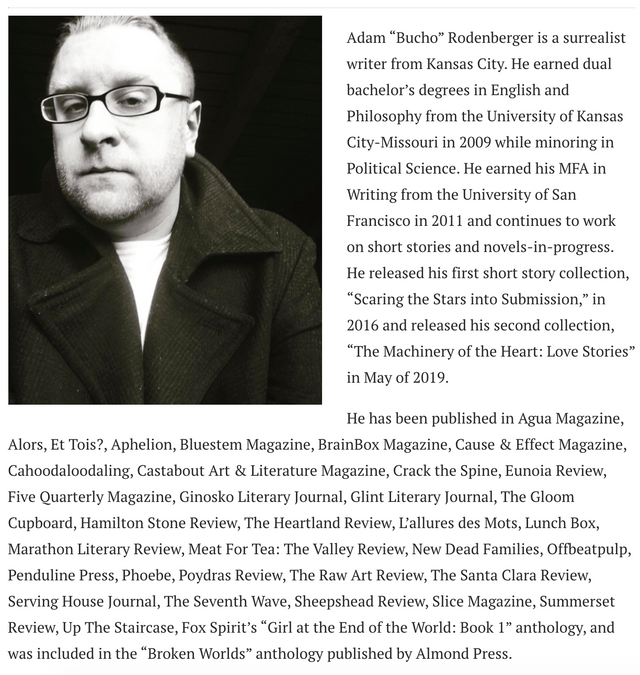"Orchids & Moonlight" - A Surrealist Short Story
[This story of mine was published by Inlandia Magazine earlier this year. I'll include an excerpt below, but follow the link to read an incredibly dark story about a family handling their familial inadequacies in unique and disturbing ways.]

"In this house, where decay has made a home, the father walks aimlessly through the hallways, searching for his name in the dust motes that flit through the sunlight striping the walls. He will shuffle around the entirety of the square footage of the home and examine every nook and cranny. He will run his calloused fingers along every splintered edge of wood, stopping only a moment to suck the blood when stuck. But he knows every edge of this house and knows that his name is lost somewhere in its walls; behind the wilting paper peeling down in several places where he has gone exploring behind its surface; behind the load-bearing walls; behind the plaster; behind everything.
The son is outside, shining. He plays with metal cars and planes in the grass, each blade of sunlight striking against their surfaces, slicing through the steaming hot afternoon in bright flashes of memory lapse, of synapse collapse, of instant brain-fry. Even the birds are made of sweat, their beaks stilled, their mating calls muffled by the thick air. The boy swings the plane around him in a circle, makes whooshing noises with his mouth. The trampled grass beneath his shoes rises briefly before being stomped down again. The boy is watched by several pairs of eyes hidden behind wispy curtains up and down the street.
The father cannot remember where he lost his name. Or when. Something inside him, a voice or a mouth or another him, gnaws at the inside of his brain and chews at it from morning until night. The voice or the mouth or the other him tells him that his name never was, that he could not possibly lose something that had never ever been in the first place. Soon the voice or the mouth or the other him quiets, goes to sleep inside him and he goes back to looking, to running his calloused hands along the body of the house like the cautious lover that he never was.
The boy has no friends; the neighborhood has not grown any since the others went away. When the boy gets older, he will randomly yell and scream at inanimate objects. He will feel the rage build up inside him like steam, warming him from the inside out until his skin is a splotchy, angry red. He will become pure id, a ball of black hatred coming out of nowhere. He will kick at the grass and throw his fists at the sky. He will reach out to hurt anyone and anything that crosses his path, no matter their good intention.
The walls have fingernail-shaped divots running up and down, left and right. The father has sought his name in every inch of house, his fingernails caked with the white powder of drywall and the crumbled nature of peeled paint. His arthritic hands ache from the work, but he continues to search because he knows his name is hidden in the walls of the house somewhere. It is not a buried treasure, his name; it is an object, a thing he holds dear, an abstract that makes him whole, though he does not understand how.
The father fancies himself a kind of mortician, digging his fingers into, and under, the skin of the home. He imagines the framework like some great skeleton, the bones inside the walls holding up the house and keeping its skin safe and intact. He wants to slide his fingers beneath the surface and let them find whatever they wish to find. The father hopes his name is a part of the family secrets hidden inside the walls. He does not remember how long he’s been seeking the name out, but it is on the tip of his tongue and fading more with every passing day. The name is blurred, fuzzed out, a shimmer on his brain. When he tries to speak it, the name sticks in his chest, clogs his throat, refuses to come out and make itself known.
The name has become a secret, a myth, a legend. Though the father was born with it long before he ever had the name ‘father,’ it still escapes him and hides in this home of his with all the other secrets that burn from the inside out, flameless.
The mother is in the backyard, staring down into the pool. It is a bright, unnatural blue and her reflection in it feels inappropriate. A half-empty handle of vodka hangs limply from her left hand. It is the same vodka she drank yesterday, and the day before. She will stand there, drinking and swaying to the rhythm of the waves blown around the pool. Will she fall in this time the way she has a hundred times before? Or will her wobbly legs keep her firmly on the cement edge the way they have the other hundred times before?
The father screams at the walls, calls them names, makes up epithets to make the plaster really feel his wrath, to know that he’s serious. He clutches at the blackened walls, rips apart the paper and the trim work and the wires and the paint and the glue and the insulation and then finds himself inside a black room that never was. The father decides that he is ready for death to come and take his nameless body from him, to wrestle it from his palsied grasp and steal away with it across the skies. He turns to look back through the entrance he’s made and says nothing as he stares back into the dim light of the living room.
The son screams at the plane, calls it names, makes up epithets to make the imaginary passengers really feel his wrath, to know that he’s serious. The quiet birds above stare at him curiously as he throws the plane down hard into the ground. The nose sticks in the soft dirt, the tail high in the air, and then falls over shortly after. Soon, he is jumping up and down on the plane, hoping to break it into a million pieces with all the people still inside. When he stops, the birds take flight and move to a tree farther down the street.
The mother screams at the pool, calls it names, makes up epithets to make the water really feel her wrath, to know that she’s serious. The sun screams back at her from its reflection in the pool, blinds her briefly, and she loses her balance. As she falls into the pool for the one hundred and first time, the bottle of vodka shatters on the pool’s edge; the shatter sprinkles and breaks the pool surface, and now the mother is treading glass and trying not to breathe in the sharp. She feels the vodka-coated slivers cut into her buoyant arms; tiny rivulets of blood begin turning the blue water a shade of purple. The mother leans against the edge of the pool and closes her eyes.
The father sits, cross-legged, on the dark and dirty floor of the hidden room that never was. He exhales as he does so; it is the sound of time and old age escaping from inside him. It is a reminder that his body, though it never really had been, is no longer a temple. He knows that he is rotting from the inside out. His body is fighting against an unseen enemy, an invisible force. The father is content with sitting on the sidelines and letting his body fight the war for him. He can feel his organs changing on him; they no longer pump and undulate the way they should. The medication no longer works; the water he drinks with his pills always tastes of poison and revenge, and so he comes to hate the mother, believing she has changed the quality of the water coming out of the faucets.
Slow, swirling smoke begins to fill the room. A single wisp that grows in length and breadth. Its origin is a mystery, like everything else in the house. The father inhales and the smoke finds its way into his nostrils; he can feel its heat inside him, running its rough, peppery edges along the surface of every vein and artery, coating his bloodways in ash and odor. The father inhales the wisp again, becomes one with the smoke that now has found its way back out through all the pores and hair follicles running up and down his legs.
The room allows the smoke to leave, and he watches as it trails out through the hole in the wall. He knows the wife will have something to say about the smell, but he shuts his eyes and keeps his mouth shut for the moment. He will put her future anger on the backburner. He will let that particular fight simmer elsewhere while he continues his search for a name that is both his and completely out of reach.
When the day is done, the boy returns home with his broken toys. He will place them in their proper place, but he will never play with them again. Though he seeks her out, he cannot find his mother. Though he seeks him out, he cannot find his father. The boy is on his own, left to fend for himself in the coming dusk that is nightfall."
To continue reading, follow the link below:
https://inlandiajournal.com/adam-rodenberger/
